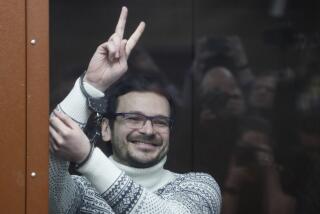Yeltsin Evicts Gorbachev’s Foundation
- Share via
MOSCOW — Russian President Boris N. Yeltsin gave his longtime rival Mikhail S. Gorbachev a figurative slap in the face on Wednesday, evicting the former Soviet president’s research foundation from its spacious complex.
The move was just the latest in a long, recently escalating battle of words and wills between the two.
Part of their struggle has centered on whether Gorbachev will comply with a Russian court’s demand that he testify about possible wrongdoing that occurred when he served as chief of the now-banned Communist Party.
But on Wednesday, Gorbachev went after Yeltsin. In a published interview in a popular newspaper, he said Yeltsin should step aside and let a supreme state council steer the country out of its crisis.
“The president is clearly not coping with his duties, he is not coping,” Gorbachev told Komsomolskaya Pravda. “I do not want him to lose, but he is losing.”
Gorbachev’s spokesman, Alexander A. Likhotal, described the struggle between Gorbachev and Yeltsin as a tug of war in which “only one man--Yeltsin--has a hold on the rope.”
When the Soviet Union was in its final disintegration late last year, Gorbachev said he would hold his tongue and not criticize Yeltsin’s policies; Yeltsin, in turn, agreed to help him keep face by setting him up in an elaborate, four-building complex for his Gorbachev Foundation.
But slowly, Gorbachev has grown stronger and stronger in denouncing Yeltsin’s policies.
Yeltsin, in turn, has slowly stripped from Gorbachev the privileges he received when he stepped down as president of a country that no longer existed. Gorbachev has lost his battalion of security guards, luxury cars and now his foundation’s home.
A Yeltsin decree was distributed late Wednesday night, saying simply that the buildings and property now used by the International Foundation for Socio-Economic and Political Studies--the Gorbachev Foundation--are to be transferred to the Financial Academy, a state institute for training personnel for Russia’s financial and banking systems.
Likhotal said that he learned of Yeltsin’s decree on the 9 o’clock television news and that Gorbachev’s think tank had not been officially informed of its “homelessness.”
Although the decree said the Financial Academy would allow the foundation to lease 1,000 square meters in one building--about one-sixth of its current space--Likhotal predicted that the rent would be too steep for the think tank.
He asserted that Yeltsin ultimately will pay for his actions against Gorbachev--acclaimed in the West for his role in ending the Cold War--because they will damage his image abroad.
Yeltsin’s “emotions are running ahead of his reason,” Likhotal said.
But Gorbachev’s own reputation appears in danger of being tarnished, as, for the second time on Wednesday, he ignored a summons to appear before Russia’s Constitutional Court.
The court is considering whether Yeltsin acted properly when he banned the Communist Party after the hard-line coup attempt of August, 1991; the judges also are pondering the very legality of the Communist Party, which ruled the country for seven decades.
Justice Minister Nikolai Fyodorov branded Gorbachev a “serious offender” in an interview with the television network shared by the Commonwealth of Independent States, the loose alliance of some former Soviet republics.
The court has fined Gorbachev, the former Kremlin chief and onetime Communist Party general secretary, a symbolic 100 rubles (about 30 cents) for ignoring his first summons; the judges denied him permission to leave Russia until he testifies.
They decided to convene today in a closed session to consider what further action might be taken against Gorbachev.
After speaking to the Russian legislature on Tuesday, Yeltsin told journalists that Gorbachev’s refusal to appear before the court showed blatant disrespect for the law.
But Gorbachev has defended his refusal to appear before the court, saying the trial is nothing but a political show with the aim of disgracing him.
“There is no lawyer who can represent me before the only tribunal to which I have to reply, that of history,” he said.
He expressed outrage that he was not allowed to travel to South Korea, calling himself the first post-Soviet refusenik--referring to the would-be emigres refused permission to leave under past Soviet leaders, including himself.
The Italian government registered a formal protest with the Russian government Tuesday over the ban, which looks likely to prevent Gorbachev from traveling to Italy next week as planned.
More to Read
Sign up for Essential California
The most important California stories and recommendations in your inbox every morning.
You may occasionally receive promotional content from the Los Angeles Times.













